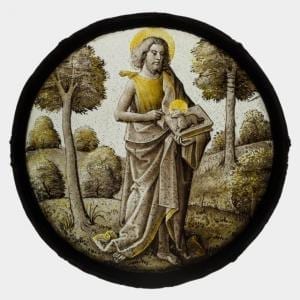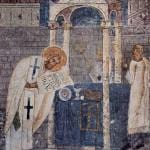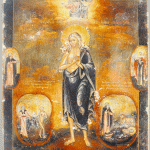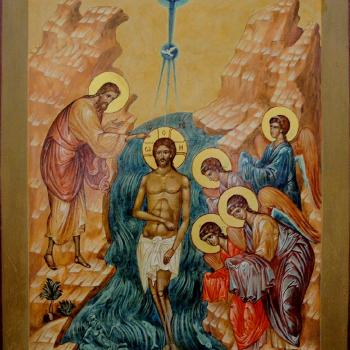
St. John the Baptist had one mission: prepare the way for the coming of Christ. This is what his life was about. He did not know what to expect when Christ revealed himself to the world. Indeed, it was a great surprise to him when Jesus came and asked to be baptized. John humbly accepted his place in salvation history. He did not look for glory for himself. He did what he knew, and he did it well. He was there to prepare the way for Christ, to make sure people were ready for what Christ would do when he was amongst them. They needed to be aware of who and what they were before God. They needed to realize that they could be and should be better, which is why he called them to repentance. And he offered to them a symbolic way in which they could embrace their repentance, a way in which they could rise up and try once again to be the people God wanted them to be. Thus, John baptized those who came to him. He didn’t invent the practice of baptism, but he transformed its significance so that those who came to him, truly desiring to change their ways, could and would have a way to represent that change:
John the baptizer appeared in the wilderness, preaching a baptism of repentance for the forgiveness of sins. And there went out to him all the country of Judea, and all the people of Jerusalem; and they were baptized by him in the river Jordan, confessing their sins. Now John was clothed with camel’s hair, and had a leather girdle around his waist, and ate locusts and wild honey. And he preached, saying, “After me comes he who is mightier than I, the thong of whose sandals I am not worthy to stoop down and untie. I have baptized you with water; but he will baptize you with the Holy Spirit” (Mk. 1:4-8 RSV).
John knew his purpose, and with it, he knew his own limits. He did not try to glorify himself. He understood that what he did would be nothing in comparison to what could and would be done by God. John shows us the way we should all be in relation to our work. We can acknowledge the good which we do, but, like him, we must be humble about it. We must always hand over what we do to God. If God wills, God’s grace will be given to our work, making it that much more effective. If, on the other hand, we think it is all in our hands, and the greatness of what we do lies in us alone, we will never achieve true greatness, as we will not be open to God’s grace and how it can make everything we do greater.
We should truly learn the lesson given to us by John. No one born of a woman was greater than he (which is not to say, there cannot be, and will not be, his equal). John was great because he allowed himself to be humble. He followed the promptings of God in his life. He engaged God, doing what he can to prepare the world for Christ, to be the last of the prophets of the Old Covenant. Everything he did, he did pointing to God. He told people not to put their focus on him. Every step of the way, the whole point of what he did was to get people to seek after God. John did not want to be the center of attention; he knew the center should always be with God. He did not reject the work which he was called to do; he did not think, if he centered himself on God, that meant God would do all things and so he should do nothing. Rather, he knew the right way to center himself with God was to cooperate with God, to work with God, to follow through with the mission God had given to him while not being attached to himself and the good which he did. His baptism was not intended to be more than a pointer, as a way to help others direct themselves towards God. He knew that the Holy Spirit would come, and do far greater things, and that the Messiah would be involved, but he did not know how that would connect with his own mission. He could not have foreseen that Jesus would come to him to be baptized in order to take up his baptism and transform it, making it a way for us to join ourselves with the messiah.
We, too, must follow God in our lives, to do as God would have us do. Like John, we should not exalt ourselves when we do what is right. Like John, we should recognize the good of what we do is good but limited when it is not touched by God and God’s grace. Grace perfects nature, yes, but it can do far more than that, for grace also deifies. It takes the good which we do and transforms it into something better. No matter what we do, there is always something more which can be done, something better which can be done. If we assume too much for ourselves, if we become prideful of what we do, we are liable to cut ourselves off from grace and embrace some evil through that pride.
John shows us the way. We are to center ourselves on God, not by some quietist retreat from the world which leaves us doing nothing, but engaging God, acting alongside God, always letting God decide how to use what we do for the greater good. We must realize that we cannot do all things ourselves; we need to work with God, and through God, with others. Likewise, we must realize that there will be a time to truly die to the self, to let things go, to realize our mission is mostly complete, and to prepare ourselves for its ending (the time in which our temporal existence will come to an end). We must do what we can, but always keep in mind that there will be who come after us, many who likely will do more than we have done, and accept it with good grace; we must make do with what we have given, and accept it with gratitude, awaiting the reward which is to come to those who come to the end of their work in fidelity with Christ:
As for you, always be steady, endure suffering, do the work of an evangelist, fulfil your ministry. For I am already on the point of being sacrificed; the time of my departure has come. I have fought the good fight, I have finished the race, I have kept the faith. Henceforth there is laid up for me the crown of righteousness, which the Lord, the righteous judge, will award to me on that Day, and not only to me but also to all who have loved his appearing (2 Tim. 4:5-8 RSV).
Throughout our lives, we should fight for what is good and true. We must struggle against temptations, against those inclinations which suggest us to go against the path Christ established for us to follow, the path of love, a path which ultimately requires us to die to the self. We must always let ourselves humbly recede as we let God be praised and receive all the glory. Then God can and will work in and through us, granting great grace to the world through us. This is what John did. He prepared the way. He pointed to God, and when the time came, when Christ came, he allowed himself to recede. John didn’t look for glory for himself. And neither should we.
Stay in touch! Like A Little Bit of Nothing on Facebook.
If you liked what you read, please consider sharing it with your friends and family!













